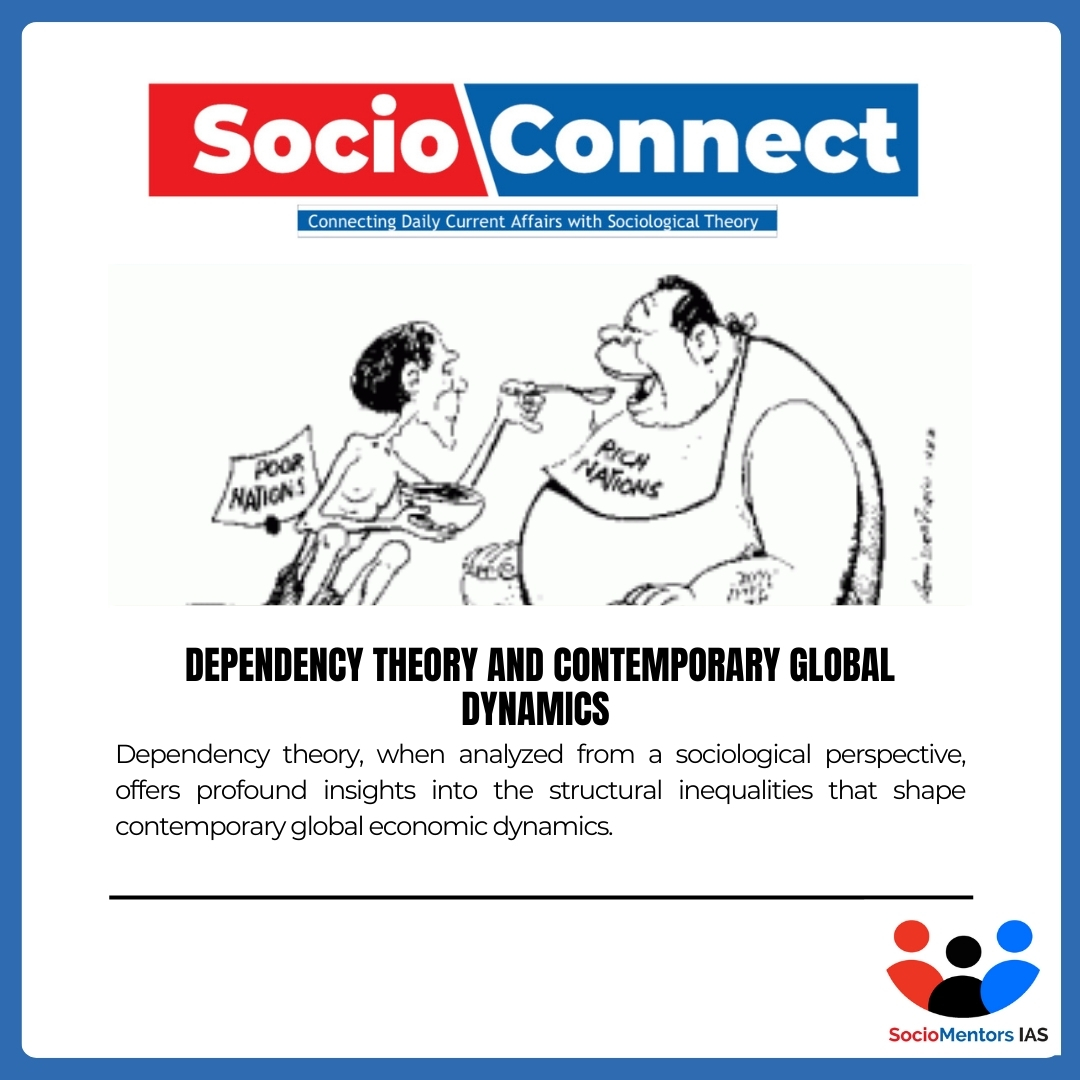Dependency Theory and Contemporary Global Economic Dynamics
September 5, 2024
Dependency theory is an approach to understanding economic underdevelopment in third world countries that emphasizes the constraints imposed by the global political and economic order.. The theory arose as a reaction to modernization theory, an earlier theory of development which held that all societies progress through similar stages of development. It challenges modernization theory by arguing that underdevelopment is not an early stage in a country’s evolutionary process, but a condition resulting from their exploitation by modem First World countries.
Dependency Theory and Its Key Arguments:
Dependency refers to the notion that resources flow from a “periphery” of poor and underdeveloped states to a “core” of wealthy states, enriching the latter at the expense of the former. According to dependency theory, underdevelopment of third world is mainly caused by the peripheral position of affected countries in the world economy.
- Raúl Prebisch’s theory of dependency: According to Raul Prebisch increases in the wealth of the richer nations was at the expense of the poorer ones. Underdeveloped countries offer cheap labour and raw materials on the world market. which are sold to advanced economies who transform them into finished goods. Underdeveloped countries end up purchasing these finished products from developed countries at higher prices, depleting the capital they might otherwise devote to upgrading their own productive capacity. The result is a vicious cycle that perpetuates the division of the world economy between a rich core and a poor periphery.
- Andre Gunder Frank’s theory of dependency: In his book ‘Development of Underdevelopment’, he argues that developing nations have failed to develop not because of ‘internal barriers to development’ as modernization theorists argue, but because the developed West has systematically underdeveloped them, keeping them in a state of dependency (hence ‘dependency theory’.). The world Capitalist system is organised as an interlocking chain into a wealthy ‘metropolis’ or ‘core’ nations and an undeveloped ‘satellite’ or ‘periphery’ nations. The core nations with their superior economic and military power exploit developing countries by extracting their natural resources. He argued that the developed nations had a vested interest in keeping poor countries in a state of underdevelopment so they could continue to benefit from their economic weakness. He highlighted the role of Multinational Companies (MNCs) and Corporations in draining out (extracting) the surplus from periphery countries (developing) into the core (developed).
- Paul A. Baran’s theory of dependency: He views underdevelopment of the less developed countries as a consequence of the fact that the developed rich countries exercise dominance and imperialist assertion over the former. According to him, the surplus of developing countries was wasted by the ‘lumpen-bourgeoisie’ which included moneylenders, real estate agents and others who are considered to be non-productive and parasitic, and by domestic industrial producers who were monopolistic, and believed in discouraging competition.
- Immanuel Wallerstein’s World-systems theory: He postulated a third category of countries, the semi-periphery, intermediate between the core and periphery. Core countries which are wealthy and powerful focus on higher skill, capital-intensive production and are highly industrialised and produce manufactured goods. They have strong central governments, extensive bureaucracies and powerful militaries. Semi periphery lies between the core and the periphery. They are industrialized, but with less sophistication of technology than the core; and it does not control finances. They are also comparatively weak militarily. They tend to export more to peripheral nations and import more from core nations in trade. Semi-peripheries act as buffers between cores and peripheries. Periphery countries focus on low-skill, labour-intensive production and extraction of raw materials. They export this raw material to the core region. According to Immanuel Wallerstein, a core nation is dominant over all the others when it has a lead in three forms of economic dominance -productivity dominance, trade dominance and financial dominance over a period of time.
Relevance of Dependency Theory in understanding contemporary global economic dynamics
- Neocolonialism and Global Capitalism: The Dependency Theory argues that the economic relationship between developed and developing countries mirrors colonial patterns, where the Global South remains dependent on the Global North for economic resources and decision-making power.
-
- For example, the multinational corporations maintain control over the supply chain and profit from the lower production costs in developing countries, while the local economies struggle to achieve sustainable development and maintain autonomy in decision-making.
- Global Governance and Institutions: The Dependency Theory critiques the existing global governance structures and institutions, such as the United Nations, and the International Monetary Fund, for perpetuating dependency relationships. These institutions often impose policies and conditions that benefit the interests of the Global North at the expense of the Global South.
-
- For example, the decision-making structures within the UN reflect the power dynamics of the global North and maintain the dominance of developed nations. The Security Council with veto powers limited to 5 members from developed countries can limit the ability of developing countries to have a significant influence on decisions that affect global governance and international relations.
- Debt Burden and Financial Dependence: Dependency theorists highlight how developing countries accumulate significant levels of external debt, which further reinforces their economic dependence. The global financial system and institutions often play a role in perpetuating this debt burden, leading to constraints on economic growth, social development, and sovereignty.
-
- For example, IMF whose director board consists of members from developed countries has been criticized for perpetuating economic dependency on developing countries through its lending and conditionality policies that require recipient countries to implement structural adjustment policies to benefit the developed countries.
- Neocolonialism and Cultural Dependency: The Dependency Theory argues that the cultural dominance of the Global North, including language, media, and cultural products, perpetuates a form of cultural imperialism that reinforces economic disparities and dependency relationships.
-
- For instance, the popularity of Hollywood films and American television shows overshadows and marginalizes local cultural industries. This cultural dependency can lead to the erosion of indigenous cultural practices, languages, and identities as they are supplanted by Western cultural products hurting local economies.
- Unequal Terms of Trade: Developed countries often set the terms and conditions for trade that favour their own interests, resulting in disadvantaged positions for developing countries.
-
- For example, the WTO’s rules and policies often favour the interests of developed countries, creating barriers for developing countries to protect their domestic industries and pursue alternative development strategies.
- Social and Environmental Consequences: The Dependency Theory highlights the social and environmental consequences of the global economic order. Exploitative labour practices, environmental degradation, and social inequalities are often perpetuated in the pursuit of economic growth in the Global South.
-
- For instance, low-income communities, indigenous peoples, and coastal populations often bear the brunt of climate change impacts such as extreme weather events, sea-level rise, and changing agricultural patterns whereas according to IPCC’s Fifth Assessment Report developed countries, particularly those in North America and Europe, have been responsible for the majority of greenhouse gas emissions since the beginning of the industrial era.
The relevance of dependency theory in understanding contemporary global economic dynamics lies in its ability to shed light on the persistent economic disparities, power imbalances, and structural constraints that exist between developed and developing countries. It highlights the ways in which core countries maintain their economic dominance over the periphery, shaping global trade patterns, technology transfer, and resource extraction.



